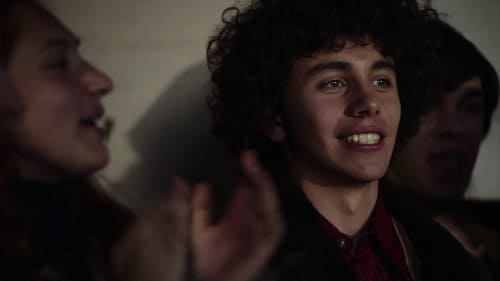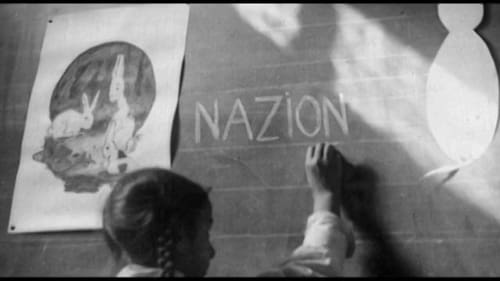
Director
It's 1961 in the remote Argentinean Patagonia. A family of Nazi fugitives arrives at teen Frida's house looking for refuge, wanting to live a normal life with total impunity. How will this affect the youngest members of these two families?

Sound
When the pandemic first struck, Argentinian filmmaker Virna Molina was working on a documentary about the struggle for equal rights for female workers at the Buenos Aires subway. The project came to a standstill, but then Molina decided to go ahead with her film after all—however, it turned out very differently from the original plan.

Producer
When the pandemic first struck, Argentinian filmmaker Virna Molina was working on a documentary about the struggle for equal rights for female workers at the Buenos Aires subway. The project came to a standstill, but then Molina decided to go ahead with her film after all—however, it turned out very differently from the original plan.

Director of Photography
When the pandemic first struck, Argentinian filmmaker Virna Molina was working on a documentary about the struggle for equal rights for female workers at the Buenos Aires subway. The project came to a standstill, but then Molina decided to go ahead with her film after all—however, it turned out very differently from the original plan.

Executive Producer
In the early ‘70s, in Argentina, a group of homosexuals decided to confront the status quo. With testimonies from its survivors as its denouncement source, Sex and Revolution brings back the voices of those who thought in order to be recognized as political actors in a society that wasn’t prepared for them.

Sound
In the early ‘70s, in Argentina, a group of homosexuals decided to confront the status quo. With testimonies from its survivors as its denouncement source, Sex and Revolution brings back the voices of those who thought in order to be recognized as political actors in a society that wasn’t prepared for them.

Director of Photography
In the early ‘70s, in Argentina, a group of homosexuals decided to confront the status quo. With testimonies from its survivors as its denouncement source, Sex and Revolution brings back the voices of those who thought in order to be recognized as political actors in a society that wasn’t prepared for them.

Producer
In the early ‘70s, in Argentina, a group of homosexuals decided to confront the status quo. With testimonies from its survivors as its denouncement source, Sex and Revolution brings back the voices of those who thought in order to be recognized as political actors in a society that wasn’t prepared for them.

Art Direction
In the early ‘70s, in Argentina, a group of homosexuals decided to confront the status quo. With testimonies from its survivors as its denouncement source, Sex and Revolution brings back the voices of those who thought in order to be recognized as political actors in a society that wasn’t prepared for them.

Editor
In the early ‘70s, in Argentina, a group of homosexuals decided to confront the status quo. With testimonies from its survivors as its denouncement source, Sex and Revolution brings back the voices of those who thought in order to be recognized as political actors in a society that wasn’t prepared for them.

Writer
In the early ‘70s, in Argentina, a group of homosexuals decided to confront the status quo. With testimonies from its survivors as its denouncement source, Sex and Revolution brings back the voices of those who thought in order to be recognized as political actors in a society that wasn’t prepared for them.

Director
In the early ‘70s, in Argentina, a group of homosexuals decided to confront the status quo. With testimonies from its survivors as its denouncement source, Sex and Revolution brings back the voices of those who thought in order to be recognized as political actors in a society that wasn’t prepared for them.

Writer
Based on real events, the life and struggles of a student of the Buenos Aires National College during Argentina's worst dictatorship.

Director
Based on real events, the life and struggles of a student of the Buenos Aires National College during Argentina's worst dictatorship.

Director

Director
Documentary about the life and work of Jorge Luis Borges, from his own memories and reflections.

Director
Documentary about the life and work of Julio Cortázar from his own memories and reflections.

Writer

Director

Director

Director
The film tells the story of Alejandra Pizarnik: mythic Argentine poet who committed suicide at the age of 36. Her personal diaries, letters, poems, as well as accounts by close friends and family, offer us hints about the mysterious path that led her to her self-destruction. Years after its writer’s death, the poetry of Alejandra Pizarnik has been rediscovered by new generations of writers and readers, making her the most read Argentine poet in the world.

Director
The documentary narrates the life and work of the militant poet and journalist Paco Urondo who was assassinated by the military dictatorship in 1976

Director
María Elena Walsh forever revolutionized the language and imagination of children's shows. But very few know the importance of his works for adults, his political convictions against dictatorships and his defense of women's rights. Topics addressed by this work that covers the main conflicts experienced in his personal and professional life. From his adolescence as a precocious poet in an oppressive society, until his later years, after leaving the stage during the last Argentine military government.

Editor
The ideology of Catholic nationalism inspired and justified State terrorism in Argentina, through the association between the Catholic Church and the military. Leopoldo Nacht, an 84-year-old man, who lived through the persecution and disappearance of his friends in the 1976 dictatorship, investigates unpublished files to prevent fragments of this ideology from being reinstated in the new generations. It is his legacy. Assim, rediscovers throughout the history of the 20th century in Argentina, the main crimes and concepts of the nationalist ultra-right, mainly: anti-communist, anti-democratic and xenophobic.

Producer
The ideology of Catholic nationalism inspired and justified State terrorism in Argentina, through the association between the Catholic Church and the military. Leopoldo Nacht, an 84-year-old man, who lived through the persecution and disappearance of his friends in the 1976 dictatorship, investigates unpublished files to prevent fragments of this ideology from being reinstated in the new generations. It is his legacy. Assim, rediscovers throughout the history of the 20th century in Argentina, the main crimes and concepts of the nationalist ultra-right, mainly: anti-communist, anti-democratic and xenophobic.

Screenplay
The ideology of Catholic nationalism inspired and justified State terrorism in Argentina, through the association between the Catholic Church and the military. Leopoldo Nacht, an 84-year-old man, who lived through the persecution and disappearance of his friends in the 1976 dictatorship, investigates unpublished files to prevent fragments of this ideology from being reinstated in the new generations. It is his legacy. Assim, rediscovers throughout the history of the 20th century in Argentina, the main crimes and concepts of the nationalist ultra-right, mainly: anti-communist, anti-democratic and xenophobic.

Director
The ideology of Catholic nationalism inspired and justified State terrorism in Argentina, through the association between the Catholic Church and the military. Leopoldo Nacht, an 84-year-old man, who lived through the persecution and disappearance of his friends in the 1976 dictatorship, investigates unpublished files to prevent fragments of this ideology from being reinstated in the new generations. It is his legacy. Assim, rediscovers throughout the history of the 20th century in Argentina, the main crimes and concepts of the nationalist ultra-right, mainly: anti-communist, anti-democratic and xenophobic.

Editor
A documentary about the life of workers in Patagonia, Argentina.

Music
A documentary about the life of workers in Patagonia, Argentina.

Writer
A documentary about the life of workers in Patagonia, Argentina.

Director
A documentary about the life of workers in Patagonia, Argentina.

Writer
Biography of the award-winning Argentinian leftist filmmaker Raymundo Gleyzer, who was kidnapped by the CIA-backed military junta in 1976 at the age of 35. Features extensive clips from his movies as well as interviews with the people who knew him.

Director
Biography of the award-winning Argentinian leftist filmmaker Raymundo Gleyzer, who was kidnapped by the CIA-backed military junta in 1976 at the age of 35. Features extensive clips from his movies as well as interviews with the people who knew him.

Tweety
Teresa is an orphan who longs to live her own love story. She is a boarding school for minors, and the only thing she enjoys is watching the soap opera "Little love." One day the television breaks and Teresa makes the decision to escape.
























